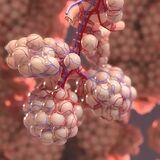masfique mehedi
School of Medicine & Health Sciences, University of North Dakota
Grand Forks, United States
906
Total views and downloads
This Research Topic is still accepting articles.
Inflammation of the lung is commonly provoked by diverse irritants ranging from environmental toxins and allergens to virulent respiratory infections, contributing to conditions like asthma and chronic bronchitis. Pathogens are known to target the epithelial cells of the lung, leading to an atypical expansion that simulates the thickening of the bronchial wall observed in vivo. This process occurs independently of the action from traditional immune cells, such as dendritic cells and macrophages, pointing towards a nontraditional inflammatory mechanism labeled as ‘cytoskeletal inflammation.’ This emerging concept suggests that the initial cellular responses to pathogens or allergens at the mucosal surface involve cytoskeletal components rather than conventional immune pathways, offering a novel lens through which to view mucosal inflammation.
This Research Topic aims to deepen our understanding of the processes and implications of cytoskeletal inflammation within the broader context of mucosal inflammation, stimulate the discovery of novel aspects of this phenomenon, and promote the development of potential interventions. We seek to elucidate how alterations in actin signaling and other cytoskeletal elements contribute to inflammation, bypassing the classical immune responses and leading to disease manifestations seen in various pulmonary conditions. The research will focus on unravelling the mechanistic pathways and exploring potential therapeutic targets that could modulate this nonconventional inflammatory response.
To gather further insights into this specialized area of research, we welcome diverse articles spanning experimental and clinical studies, reviews, and commentaries, specifically focusing on but not limited to the following themes:
1. Mechanisms of Cytoskeletal Reorganization by Pathogens
• How bacterial or viral toxins interact with the cytoskeleton.
• Host-pathogen interaction mechanisms: cytoskeletal targeting by viral proteins.
• The role of actin and microtubule remodeling during pathogen invasion.
2. Cytoskeletal Changes in Immune Cell Function and Inflammation
• Pathogen-induced cytoskeletal modifications in macrophages and dendritic cells.
• Neutrophil cytoskeletal changes during infection and their impact on inflammatory responses.
• The role of cytoskeleton in immune cell motility, phagocytosis, and inflammation.
3. Pathogen-Induced Cytoskeletal Modifications and Chronic Inflammatory Diseases
• Cytoskeletal alterations in chronic infections (e.g., tuberculosis, hepatitis) and their impact on inflammation.
• Role of pathogen-modified cytoskeleton in promoting persistent inflammation or autoimmune diseases.
4. Cytoskeletal Modifications in Host Epithelial Barriers
• How pathogens disrupt epithelial barriers through cytoskeletal reorganization and the link to inflammation.
• Cytoskeletal modifications in intestinal or respiratory epithelia and the initiation of inflammatory responses.
5. Therapeutic Approaches Targeting Pathogen-Induced Cytoskeletal Changes
• Drug targeting cytoskeletal changes to reduce pathogen-induced inflammation.
• Modulation of the host cytoskeleton as a strategy to control inflammation during infections.
6. Comparative Cytoskeletal Responses to Different Pathogens
• Comparative analysis of cytoskeletal changes induced by bacterial vs. viral infections.
• How fungi or parasites modify the host cytoskeleton and influence inflammatory pathways.
7. Cytoskeletal Modifications in Viral Infections and Their Role in Immune Evasion
• Viral manipulation of cytoskeletal proteins to evade host immune responses.
• The role of cytoskeleton in viral assembly and budding, and its contribution to inflammation.

This Research Topic accepts the following article types, unless otherwise specified in the Research Topic description:
Articles that are accepted for publication by our external editors following rigorous peer review incur a publishing fee charged to Authors, institutions, or funders.
Article types
This Research Topic accepts the following article types, unless otherwise specified in the Research Topic description:
Keywords: Cytoskeleton, inflammation, ARP2/3 complex, virus, bacterium, fungus, non-canonical, actin polymerization, filopodia, lameipodia, GTPases, RSV, bronchiolitis, bronchial wall thickening, subversion, inflammasome, globular actin, follicular actin, actin r
Important note: All contributions to this Research Topic must be within the scope of the section and journal to which they are submitted, as defined in their mission statements. Frontiers reserves the right to guide an out-of-scope manuscript to a more suitable section or journal at any stage of peer review.
Manuscripts can be submitted to this Research Topic via the main journal or any other participating journal.
Share on WeChat
Scan with WeChat to share this article
